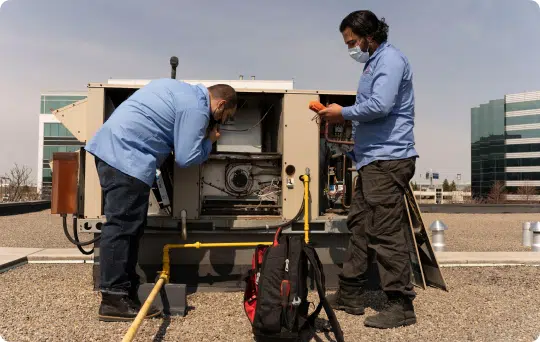Just How to Pick the Right Cooling And Heating System for Your Requirements
Choosing the ideal HVAC system is an important decision that calls for mindful consideration of numerous factors. Begin by evaluating your home's dimension, design, and unique needs, as these components dictate the required capacity and arrangement of the system. Furthermore, developing a spending plan that encompasses installment and lasting functional costs is vital. As you weigh your options, comprehending energy performance scores and the implications of your regional climate will play a considerable role in your choice. Nevertheless, the myriad of system types available can complicate this process, leading one to wonder which path inevitably leads to optimum convenience and efficiency.
Assess Your Home Size
Analyzing your home dimension is a crucial initial step in selecting the proper a/c system. The size of your home directly influences the heating & cooling capacity needed for effective climate control. A HVAC system that is too tiny will certainly struggle to preserve comfortable temperatures, resulting in increased power usage and endure the system. Alternatively, a large system can lead to brief cycling, inadequate moisture control, and ineffective procedure.
To accurately assess your home dimension, gauge the square footage of each room, considering elements such as ceiling height and the design. Furthermore, think about the insulation high quality and the variety of windows, as these elements affect thermal efficiency. Residences with open floor plans might need various system configurations compared to those with numerous separated areas.
Using the Handbook J lots computation approach can provide a more accurate price quote of your a/c needs. This technique make up different elements, including regional environment, solar gain, and tenancy patterns. By meticulously evaluating these facets, you can make sure that your picked a/c system is appropriately sized, bring about improved comfort, power performance, and durability of the devices.
Determine Your Spending Plan
Identifying your budget plan is an essential step in the a/c system selection procedure, as it sets the specifications for your choices - DMAKS HVAC. A HVAC system is a considerable financial investment, and recognizing your economic limits will certainly help narrow down selections that fit within your means
Begin by evaluating not only the initial acquisition rate yet also installation prices, which can differ substantially relying on the intricacy of the task. In addition, consider recurring expenses such as upkeep, repair work, and energy usage. A system might show up affordable originally but can bring about higher expenses over time if it is much less effective.
It is suggested to designate a contingency fund for unanticipated expenses that may emerge throughout installment or first system changes (DMAKS HVAC). Furthermore, explore financing choices or discounts that may be available, as these can ease the concern of in advance costs
Eventually, having a clear budget enables you to involve with cooling and heating professionals a lot more successfully, guaranteeing you obtain customized guidance that lines up with your monetary objectives and home demands. By being persistent about your spending plan, you can make informed decisions that improve comfort without jeopardizing economic security.
Evaluate Energy Efficiency
Energy efficiency plays a crucial function in the total efficiency and cost-effectiveness of your Heating and cooling system. Look for systems with a high Seasonal Energy Effectiveness Ratio (SEER) for cooling down and a high Annual Gas Application Performance (AFUE) rating for heating.
Additionally, consider the Energy Celebrity certification, which indicates that the system fulfills rigid performance guidelines set by the Environmental Protection Agency. Buying a Power Star-rated HVAC system can result in substantial cost savings in time, specifically in areas with extreme temperature level changes.
One more factor to assess is the system's size go to these guys and ability. A large or undersized unit can bring about inadequacy and enhanced power costs. DMAKS HVAC. Correct sizing, usually determined with a Manual J load estimation, makes sure that the system operates at optimal effectiveness


Think About Environment and Environment
When selecting a heating and cooling system, it is crucial to think about the local environment and environmental conditions, as these variables substantially affect the system's performance and efficiency. Different areas experience varying temperature level extremes, humidity levels, and seasonal modifications, every one of which influence home heating and cooling demands.

Additionally, regional ecological elements, such as air high quality and prospective allergens, must notify your choice. Solutions equipped go to my site with sophisticated filtration innovations can help minimize contaminants and offer cleaner air. Furthermore, take into consideration the energy sources available in your location-- some a/c systems are extra reliable when powered by natural gas or renewable resource resources.
Inevitably, straightening your cooling and heating system choice with your neighborhood climate and environmental considerations will certainly lead to boosted convenience, improved effectiveness, and lower power expenses.
Explore System Types and Features
As property owners seek to enhance comfort and performance, exploring the numerous sorts of cooling and heating systems and their one-of-a-kind features comes to be important. The primary sorts of heating and cooling systems consist of air conditioning, heatpump, ductless mini-split systems, and heaters. Each system provides distinct benefits tailored to different demands and choices.
Air conditioning systems supply uniform cooling throughout a home, making them ideal for bigger spaces. Heatpump function as both heating and cooling services, making use of electrical power to move heat, which can result in lower power costs. Ductless mini-split systems are coming to be increasingly popular as a result of their flexibility and ease of setup, permitting house owners to regulate the temperature level in specific areas without extensive ductwork.

Verdict
Finally, selecting the ideal HVAC system demands careful factor to consider of various elements, consisting of home dimension, budget constraints, energy effectiveness, local climate, and offered system kinds. A thorough analysis of these aspects ensures ideal comfort and cost-effectiveness. By complying with an organized approach, house owners can make enlightened decisions that straighten with their details needs and preferences, inevitably causing improved interior air high quality and energy cost savings.